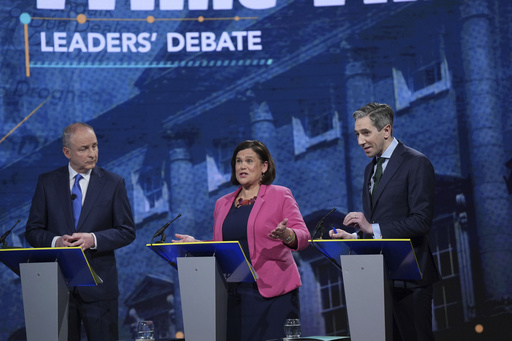
DUBLIN — Gerry Hutch’s campaign poster blends into the crowded landscape of independent candidates vying for attention from disenfranchised voters as Ireland gears up for parliamentary elections on Friday. The poster appeals to a desire for change, declaring, “We need change, and I’m your man.” On the bustling streets of Dublin, some citizens echo this sentiment, despite Hutch’s controversial background.
Prosecutors have accused Hutch, infamously known as “the Monk,” of leading an international crime syndicate engaged in robbery and drug trafficking. Last year, he was acquitted of charges related to the murder of a rival gang member. Most recently, he was released on bail in Spain’s Canary Islands on money laundering allegations and returned to Ireland to participate in the election.
Among the voters, Derek Richardson, an unemployed Dublin resident, expressed a desire for Hutch to succeed, citing a general discontent with the established political figures. “There’s plenty of other gangsters out there in suits,” he remarked. This growing anti-establishment sentiment mirrors a global trend where voters are expressing dissatisfaction with their governments, holding incumbents accountable in this unprecedented election cycle.
In Ireland’s political landscape, the traditional dominance of center-right parties, Fine Gael and Fianna Fail, has faced increasing scrutiny. These parties alternated in leadership for a century before uniting in a coalition government in 2020. Recent polls indicate a shifting voter base, with support divided evenly among Fine Gael, Fianna Fail, Sinn Fein, several smaller parties, and a mixture of independent candidates that span the political spectrum.
The issue of housing emerges as a critical topic throughout the campaign. The soaring prices for both apartments and homes, which have surged by 10% in just a year, have led to a significant shortage. According to a government-commissioned housing report, there exists a shortage of up to 256,000 homes in Ireland. Young professionals, including teachers and nurses, are particularly affected, struggling to find affordable accommodations.
Political science expert Eoin O’Malley of Dublin City University notes that the rising cost of living has prompted many young adults to consider emigration, despite the availability of jobs in the country. He emphasized a sense of anxiety among middle-class parents that their children may never return after seeking opportunities abroad.
Carole York, a 73-year-old resident battling eviction from her rural property near Waterford, added a personal touch to the housing crisis narrative. She transformed her home into a sanctuary for rescued ponies but now faces the possibility of losing it to a landlord intent on selling the valuable property. York observed that countless elderly individuals find themselves in similar precarious situations due to escalating property prices. “I never had the slightest interest in politics until this election,” she shared, now planning to vote for parties that advocate for renters’ rights, such as Sinn Fein or the Labour Party.
The immigration debate has similarly taken center stage, as new arrivals reshape Ireland, a nation historically marked by its own emigration. Approximately 20% of the population is foreign-born, and recent statistics show that around 120,000 newcomers settled in Ireland over the past 12 months, the highest figure since 2007. The influx includes over 100,000 Ukrainians seeking refuge, alongside many migrants from regions plagued by conflict and poverty, creating challenges in providing adequate housing for these individuals.
A notable incident involving a stabbing outside a Dublin school last year, linked to a foreign suspect, ignited significant unrest in the country. While Ireland has yet to see the emergence of a strong far-right political faction, several independent candidates with anti-immigrant stances are positioning themselves for election in different regions. Hutch, maintaining a more cautious approach, acknowledges the need for immigration but believes that newcomers should contribute rather than rely solely on state support.
Caroline Alwright, a market vendor in Dublin, articulated her frustrations about the refugee situation, asserting that “the country’s overloaded with refugees, and it’s not right.” Currently disillusioned with major parties, Alwright plans to vote for an independent candidate.
In response to public dissatisfaction, leading political parties are presenting plans aimed at controlling immigration and significantly increasing housing availability. The government boasts financial advantages derived from substantial back taxes, including a payout from Apple ordered by the European Union. Prime Minister Simon Harris’s Fine Gael party has pledged a substantial financial investment to prepare for potential economic challenges.
Harris’s campaign, however, has suffered from missteps, including a notable incident involving a disabled worker that drew widespread attention online. Meanwhile, Fianna Fail’s Deputy Prime Minister Micheál Martin appears confident, maintaining a visible presence on the campaign trail and acknowledging the need for new policies, even if not a complete overhaul of the current governing parties.
Sinn Fein, which contends for the reunification of the Republic of Ireland and Northern Ireland, secured the most votes in the last election but was left out of government due to its prior connections with the Irish Republican Army. Despite a dip in poll ratings linked to its immigration stance, party officials believe they’ve regained momentum as the elections draw closer. However, they face obstacles in finding coalition allies, leading analysts to predict a possible repeat of a Fine Gael-Fianna Fail coalition in the upcoming election.
Sinn Fein leader Mary Lou McDonald called on disenchanted voters to reconsider their support for independent candidates, asserting that genuine governmental change is achievable only through her party. “Do you want a change in government?” she pressed during a campaign rally. “If that is what you desire, then Sinn Fein is the party to vote for.”
